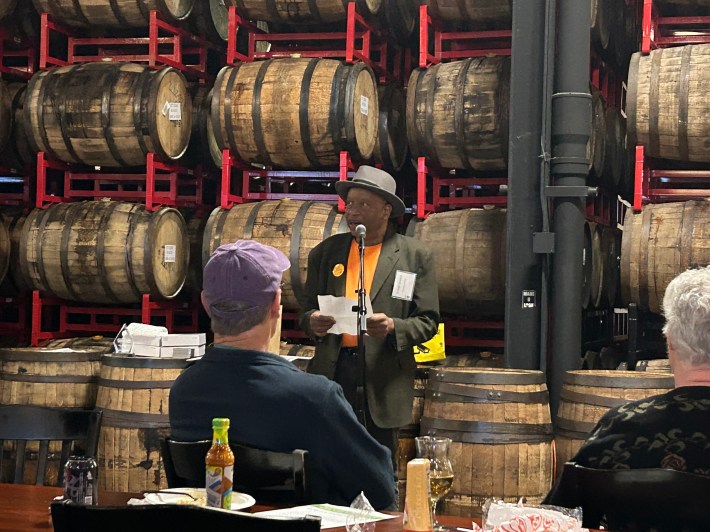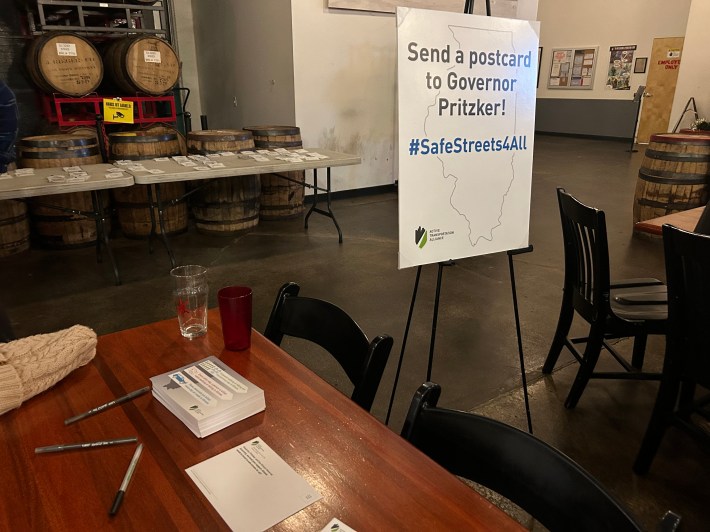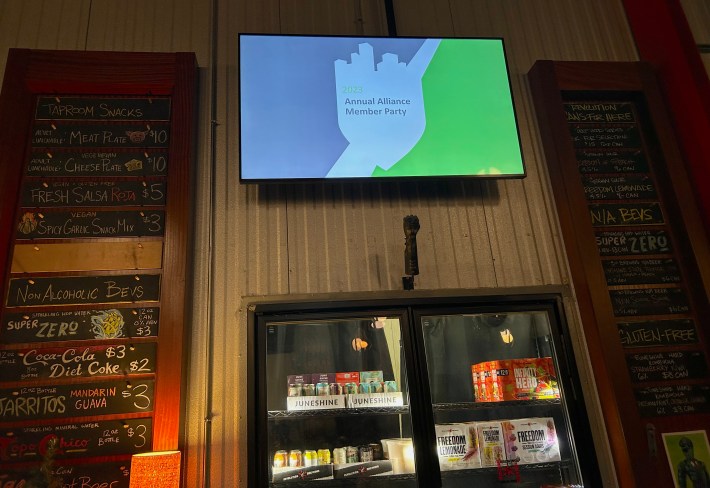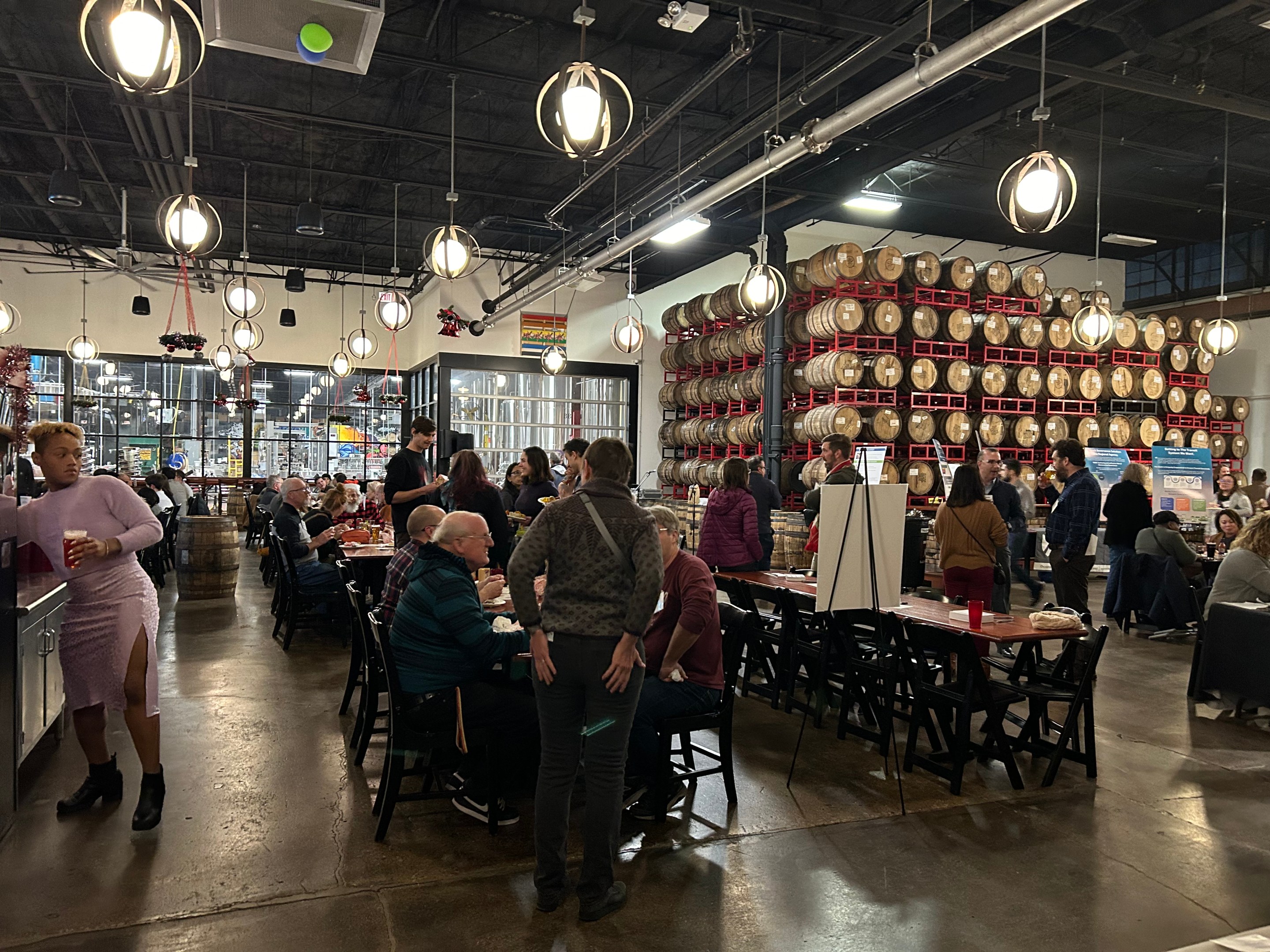
It was a full house at the Revolution Brewing Taproom on Tuesday for Active Transportation Alliance’s annual member party. Almost every chair in the cavernous Kedzie Avenue taproom in Avondale was filled. The bike-slash-coat room brimmed with both—evidence that Chicago is amply populated with cold-weather riders. Temps were in the teens that night and I had opted for the bus.

The annual event is a chance for ATA members to mingle, enjoy some local craft brew, and learn a little about the organization’s efforts for safer streets and better transit over the last year. A postcard-writing station was set up for constituents to ask Governor JB Pritzker and the Illinois Assembly to invest in Safe Streets for All—a campaign to reduce traffic violence through infrastructure investment and policy change that has been gaining traction in Chicago and beyond. A light dinner of wraps, salad and rice was set up near a table soliciting volunteers.

Volunteer recognition kicked off the formal program. Events managers Christian Helem and Brittany Gillespie handed out volunteer awards to two members who did a lot of heavy lifting at ATA’s massive Bike the Drive event. Campaign organizer W. Robert Schultz III took the mic to present an award for advocacy. Schultz, a self-described “public transportation nerd” (“Ask me about the history of trains and we’ll spend a few hours together" – where was my father for this?), serves as advocacy committee co-chair of the Transportation Equity Network, a coalition pushing for racial and mobility justice at local, state and national levels. The advocacy award went to TEN co-chair Jose Acosta of the Little Village Environmental Justice Organization.
Board president Rubani Shaw called the board business section of the meeting to order and a slate of six candidates—five incumbents, one new—were expeditiously approved and voted in. Two outgoing board members were recognized for their service.

Director of advocacy Jim Merrell gave a state-of-ATA address (executive director Amy Rynell was home sick), reviewing accomplishments from 2023 and plans for the upcoming year with brevity and humor. The first win Merrell listed was new legislation that will allow roads in Chicago owned by the Illinois Department of Transportation to be treated like the urban streets they are, with accommodations to be considered for all road users, not just car and truck drivers. IDOT (“a four-letter word,” Merrell quipped) has been a barrier to biking and walking infrastructure improvements in the past, and three new laws promise to make IDOT roads safer in the future.
Merrell mentioned the city’s wave of protected bike lane installations to applause, as well as pedestrian bump outs and bus-boarding islands. He celebrated the first bike/ped/transit-focused mayoral candidate forum, ATA’s participation on Mayor Brandon Johnson’s transition committee, and the new mayor’s presence at 2023 Bike the Drive.
Peeks into 2024 were brief and not terribly detailed. Merrell said ATA and collaborators will launch a sustainable transit campaign at the state level. The organization will continue advocating for Safe Streets for All, reducing speed limits and improving bus service along “three or four” major corridors. Merrell also invited attendees to check out ATA’s new leadership advocacy training and get more involved in the work.

An info table provided a little more detail on ATA’s upcoming state-level advocacy efforts. Four posterboards and handout summarized the impending fiscal crisis facing Chicagoland’s public transit agencies when federal pandemic relief funding runs out, and reforms proposed by ATA and partnering organizations. To improve service, safety and convenience of public transportation, the coalition proposes combining CTA, Metra and Pace governance under a single transit entity. This would consolidate planning and operations of the region’s public transit agencies and allow for fare integration between systems—a measure that would greatly benefit riders on the South Side, who must often transfer between CTA, Metra and Pace to reach their destinations.
ATA and partners are proposing a funding model to generate $1.5 billion in new funds annually. A chart showed how far Chicago transit is behind its peers in state funding for operations: a measly 17 percent compared to 27 percent in New York and just over 50 percent in Philadelphia. As I was reading the posters, Schultz told me he is preparing to travel to Washington DC to advocate for these reforms with house representatives.

The program closed with a heartfelt farewell from marketing and events director Claire McDermott to two outgoing staff members: graphic designer Anne Evans and longtime deputy executive director Melody Geraci. Raffle tickets were drawn for a couple prizes from outdoor clothier Fjallraven and attendees were invited to stick around and mingle for a few more minutes before venturing back into the cold.

Did you appreciate this post? Please consider making a tax-deductible donation






